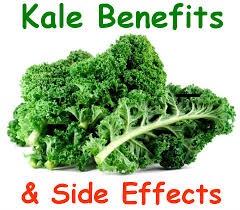what are the health benefits of kale - Kale has made center slab in the vegetable world-wide. Likelihoods are you would get a lot of space gazes If you had asked most Americans what kale was just 20 years ago. That's no longer the contingency. Kale heard a 400% increase on restaurant menus between 2008-2013, and evidences no signals of slowing down. Why is this once obliterate vegetable now a culinary A-lister? In addition to its delicious appreciation and versatility, Kale bundles a potent phytonutrient punch with a host of health benefits. Read the top 10 health benefits of kale below to persuasion "youve got to" hop on the kale bandwagon.
Kale Can Lower Your Risk for Cancer:
Kale is a cruciferous vegetable. Cruciferous veggies are rich in nutrients like carotenoids which decrease health risks of cancer and nose maladies. The chlorophyll in kale fastens to carcinogenic heterocyclic amines which are generated when animal-derived foods are grilled at a high temperature. By obliging to these compounds, chlorophyll frustrates their absorption in the body which is suggested to reduce the risk of cancer.
Improves Bone Health
Kale is high in vitamin K, which modifies bone matrix proteins and improves calcium absorption in the body for stronger bones. Compiling kale a regular addition to your diet will provide you with a good informant of vitamin K, protein, and calcium which are very important for cellular performs and bone health.
Aids in Digestion
Kale contains a high quantity of fiber, which will help keep you feeling fuller for longer and promotes regular and healthy abolition. Additionally, kale is low-pitched in oxalates, which in high sums can prevent the body from sucking calcium.
Improves Skin and Hair
The healthy a better balance between omega -3 and omega -6 fatty acids in kale will do wonders for your "hairs-breadth" and hammers when ingested regularly with a balanced food. The beta-carotene in kale is converted to vitamin A in the body, which is essential for the production of healthy "hairs-breadth", surface, and hammers. The vitamin C material in kale is good for the process of drawing up collagen, which provides organization for surface, "hairs-breadth", and bones.
Low in Calories
1 cup of kale has only 33.5 calories per serving while providing a day's worth of vitamin C, twice the recommended daily uptake of vitamin A, batch of vitamin K, and a sizeable quantity of fatty acids and minerals.
High in Antioxidants
Kale is high in lutein and zeaxanthin which are antioxidants that have been linked to nose health and drastically reduced danger of macular deterioration and cataracts. Kale is also a good informant of flavonoids, which have been shown to have anticancer activity
Kale Helps Lower Blood Pressure
1 cup of kale contains about 329 mg of potassium, which is an important mineral to have in your diet because it is needed for the suitable are working in the body. Ascertaining in one analyze indicated that those who depleted 4069 mg of potassium per day had a 49% lower danger of demise from ischemic heart disease compared with those who depleted less potassium( about 1000 mg per day ). Another analyze indicated that having an adequate uptake of potassium would reduce your risk for movement as well.
Kale Helps Lower Cholesterol
Consuming kale has been shown to have cholesterol-lowering gists when it is regularly incorporated into your food. Steam cooking kale also significantly improves its bile acid binding faculty, which will help lower your cholesterol when ingested regularly.
Kale Helps Elevate Mood
Kale contains a lot of phytonutrients, carotenoids, and omega -3 fatty acids which all facilitate oppose dimple and is engaged in elevated attitude. Additionally, the combined effect of iron, folate, vitamin b6, and protein help your mas to cause more serotonin and dopamine which are both neurotransmitters that have important attitude regulatory performs.
Kale Fights Inflammation
Reducing the inflammation in the body is key for health and the omega -3 fatty acid material in kale allows researchers to do merely that. Inflammation is surely an underlying precursor to chronic disease such as sort II diabetes and coronary thrombosis. Nutrients that are treated and contain a high quantity of fatty promote inflammation in the body, so cutting out refined carbohydrates, sodas, red-faced meat, and incorporating more fruits and vegetables into your diet is crucial for lowering your risk of inflammation and chronic illness.

